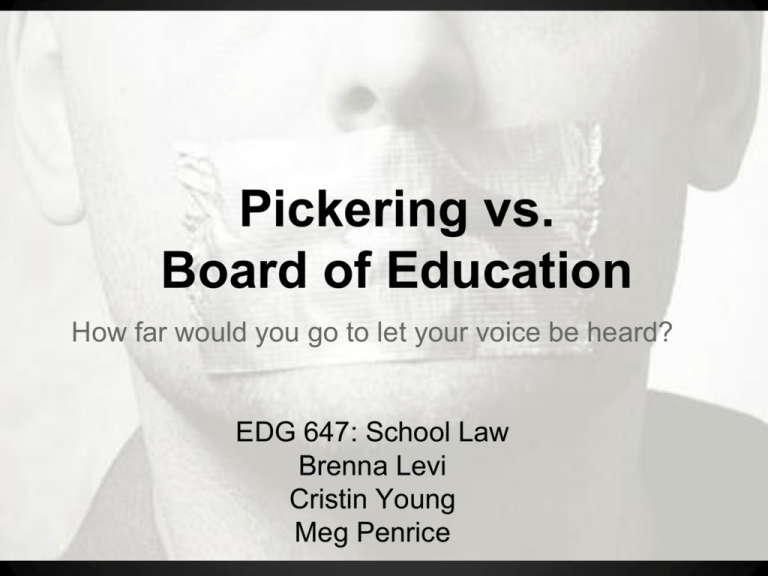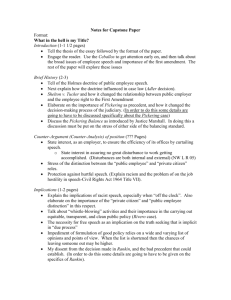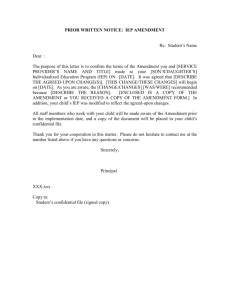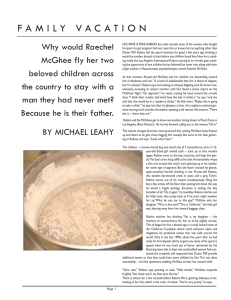Pickering v Board of Education
advertisement

Pickering vs. Board of Education How far would you go to let your voice be heard? EDG 647: School Law Brenna Levi Cristin Young Meg Penrice Outline of Presentation • Essential Questions • The First Amendment • Background • Letter Excerpts • Points of View • Outcomes • The Garcetti Decision • Educational Implications: Scenario Activity • Handouts Essential Questions 1. Does the First Amendment protect teacher's freedom of speech? 1. Can a teacher be dismissed for publicly criticizing school policy? 1. Can a teacher be dismissed for making public statements that are not accurate? The First Amendment • How well are public school teachers protected by the First Amendment? • • What exactly does the First Amendment state? Test your knowledge of the First Amendment! Background Will County, IL 1961 o The Board of Education submitted a bond proposal to the voters, which called for the raising of $5,500,000 to build new schools. This proposal passed and the schools were built with the money raised by the bond. Background Will County, IL 1964: o Two tax rate increases, intended for educational purposes, had been proposed by the board. They were both defeated. Prior to the vote on the second tax increase proposal a variety of articles from the District's Teachers' Association appeared in the local paper. These articles urged passage of the tax increase and stated that failure to pass the increase would result in a decline in the quality of education afforded children in the district's schools. A letter from the superintendent of schools making the same point was published in the paper two days before the election. Background • Will County, IL 1964: o 1964, Marvin Pickering, a public high school science teacher from Will County, Illinois had his own opinion on the distribution of funding for his local school district. Background Letter Excerpts "In last week's paper, the letter written by a few uninformed teachers threatened to close the school cafeteria and fire its personnel...If the cafeteria is losing money, then the board should not be packing free lunches for athletes on days of athletic contests...." Letter Excerpts "In reply to this letter your Board of Administration will probably state that these lunches are paid for from receipts from the games. But $20,000 of receipts doesn't pay for the $200,000 a year they have been spending on varsity sports while neglecting the wants of teachers. You see we don't need an increase in the transportation tax unless the voters want to keep paying $50,000 or more a year to transport athletes home after practice and to away games, etc. Rest of the $200,000 is made up in coaches' salaries, athletic directors' salaries, baseball pitching machines, sodded football fields, and thousands of dollars for other sports equipment." Letter Excerpts "As I see it, the bond issue is a fight between the Board of Education that is trying to push tax-supported athletics down our throats with education, and a public that has mixed emotions about both of these items because they feel they are already paying enough taxes, and simply don't know whom to trust with any more tax money." Letter Excerpts "I must sign this letter as a citizen, taxpayer and voter, not as a teacher, since that freedom has been taking from the teachers by the administration. Do you really know what goes on behind those stone walls at the high school?" Points of View • The school board terminated the teacher, saying that the letter contained false statements that "impugned" the integrity of the school system. • Pickering sued the Board because he felt the writing of the letter was protected by the First Amendment. His case was brought to the Supreme Court of Illinois. Outcomes • The court found that the school officials did violate First Amendment rights by terminating a public school teacher based on remarks made on public matters as a citizen. • Rationale: o A teacher's interest as a citizen when making public comments must be balanced with the state's interest in promoting the efficiency of its public services. The Garcetti Decision Garcetti v. Ceballos • • A 2006 Supreme Court case in which Richard Ceballos, district attorney, claimed he was passed up for a promotion by his superior, Gil Garcetti, because he criticized the legitimacy of a warrant. The court ruled against Ceballos, saying that when public employees make statements that are part of their official duties, they are not speaking as citizens under the First Amendment and are not protected from employer discipline. Educational Implications Instructions: With a partner discuss your assigned question or scenario. Objective: Decide whether the teacher's First Amendment rights were violated and what you think was the outcome of the case. Scenario 1 A state statute requires that history courses infuse more African and African-American history into the curriculum. A history teacher in that state believes that a local school district is failing to require other history teachers to infuse African and African-American history into the curriculum. Thus, the history teacher voices his concerns at various school board meetings. Subsequent to his speeches at the board meetings, the teacher was transferred many times to different schools and eventually terminated. He believed that he was terminated because of his critic of the district’s implementation of the state statute. Scenario 1 Outcome The previous scenario is based on Sherrod v. School Board of Palm Beach County, 703 F. Supp.2d 1279 (S.D. Fla. 2010). In this case, the court ruled that Mr. Sherrod (the history teacher) was speaking as a citizen on a matter of public concern at the board meetings. His official job duties did not include curriculum development or ensuring that the district complied with the state statute. Furthermore, the court ruled that Mr. Sherrod’s speech outweighed the government’s interest in efficiency. Mr. Sherrod presented his concerns a public board meeting. His concerns did not affect the harmony at the schools where he worked. In addition, he was the father of two children in the school district; therefore, he was also speaking as a concerned parent. Scenario 2 Deborah A. Mayer was a first-year teacher in the 11,000-student Monroe County, Ind., school district in January 2003 when she used an edition of TIME for Kids in a current-events discussion about the thenimpending war. According to court papers, the magazine reported on a peace march in Washington to protest the prospect of a U.S. invasion of Iraq. Ms. Mayer was asked by a student in her multiage classroom of 3rd through 6th graders if she would ever participate in such a peace demonstration. She told them that when she had driven by recent peace marches in Bloomington, Ind., related to the Iraq situation, she had honked her horn in response to a sign that said, “Honk for Peace.” “And then I went on to say that I thought it was important for people to seek out peaceful solutions to problems before going to war, and that we train kids to be mediators on the playground so that they can seek out peaceful solutions to their own problems,” Ms. Mayer said in a Scenario 2 cont'd Some parents complained to the principal about the brief discussion, and the principal barred Ms. Mayer from discussing “peace” in her classroom, according to court papers. The principal also canceled the school’s traditional “peace month.” “We absolutely do not, as a school, promote any particular view on foreign policy related to the situation with Iraq,” Principal Victoria Rogers said in a memo to school personnel at the time. “That is not our business.” The school district decided in April 2003 not to renew Ms. Mayer’s contract for the next school year. The teacher alleged that it was because of her comments on Iraq, and she sued the district on First Amendment and related grounds. Scenario 2 Outcome A U.S. District Court judge in Indianapolis granted summary judgment last year to the school district. In a Jan. 24 ruling, a threejudge panel of the U.S. Court of Appeals for the 7th Circuit, in Chicago, ruled unanimously for the district as well. “The First Amendment does not entitle primary and secondary teachers, when conducting the education of captive audiences, to cover topics, or advocate viewpoints, that depart from the curriculum adopted by the school system,” the appeals court said. The 7th Circuit judges held that Ms. Mayer’s comments were the type of on-the-job speech by a public employee that merited no First Amendment protection under a 2006 Supreme Court decision known as Garcetti v. Ceballos. In their Supreme Court appeal, lawyers for Ms. Mayer noted that the justices had stopped short of applying their Garcetti ruling to public education. “Teachers need to know if their in-class speech is ever entitled to First Amendment protection and, if so, when,” Ms. Mayer’s appeal said. Scenario 2 Outcome cont'd The justices had expressed some interest in the case. When the school district initially declined to file an answer to the teacher’s appeal, the high court requested a response. The district’s brief may have convinced the justices that the case would not be suitable for deciding the teacher-speech question. According to the Monroe County district, some parents had complained about Ms. Mayer’s “demeanor, conduct towards students, and professional competency” even before the discussion of Iraq. During the second semester, the principal had placed Ms. Mayer on an improvement plan, but the teacher’s “job performance progressively deteriorated,” the district said in its court papers. “Ms. Mayer’s speech was not the motivating factor for the nonrenewal of her teaching contract,” the district said. The justices declined without comment to hear the teacher’s appeal in Mayer v. Monroe County Community School Corp. (Case No. 06-1657). Scenario 3 A San Diego-area teacher was ordered to remove from his classroom walls religious banners that he had displayed for 25 years. Officials at Westview High School in the Poway district ordered math teacher Bradley Johnson to remove his banners proclaiming such messages as, “In God We Trust,” “One Nation Under God,” “God Bless America,” “God Shed His Grace On Thee,” and “All Men Are Created Equal, They Are Endowed By Their Creator.” Scenario 3 Outcome The U.S. Supreme Court missed a golden opportunity to clear up the continuing confusion over the free-speech rights of public school teachers when it declined March 26 to review Johnson v. Poway Unified School District. The 9th Circuit reasoned that Johnson’s banners were jobrelated speech within the meaning of the Supreme Court’s allencompassing public-employee speech decision Garcetti v. Ceballos (2006). In that decision, the Court ruled that when public employees engage in official, job-duty speech they have no First Amendment protection. Scenario 3 Outcome, cont. In their petition for high court review, Johnson’s attorneys from the Thomas More Law Center pointed out that school officials allowed all sorts of posters and banners to be displayed on classroom walls, including Tibetan prayer flags featuring images of the Buddha, posters of rock bands and musicians, and banners about gay rights, global warming and other controversial issues. In other words, the attorneys argued, school officials had engaged in viewpoint discrimination by censoring Johnson’s personal religious expression. Johnson’s attorneys also noted that the lower courts are not consistent in how they evaluate public school teacher-speech cases. Whether or not we agree with a teacher’s hanging religious messages in his classroom, his attorneys have a valid point about Scenario 4 In a 2007 Pennsylvania federal court case, a high school teacher sued her school district for violation of her First Amendment right to exercise free speech without retaliation. The teacher spoke out during instructional time about the mold in her building and her related health problems and referenced a meeting with two school district administrators in which the administrators instructed her to teach only the curriculum and not to discuss her environmental concerns or health problems in class. Scenario 4 Outcome In her case, the court held that a school district can restrict teachers’ classroom speech to curriculum-related topics only. Scenario 5 A teacher’s aide alleged that school officials failed to rehire her because of a speech she made about racial issues at a PTA meeting. The aide said the school should adopt a program to commemorate Black History month. Immediately after the meeting, the principal asked to speak with her and told her he wished she had raised this issue privately rather than publicly. Scenario 5 Outcome A lower court determined that the speech clearly touched on a matter of public concern, but that the school system’s interest in avoiding racial tensions outweighed the aide’s right to free speech. On appeal, however, the Eleventh Circuit reversed, writing that the aide’s “remarks did not disrupt the School System’s function by enhancing racial division, nor, based on the nature or context of her remarks, was her speech likely to do so.” Scenario 6 Matter of Rubino v. City of New York Christine Rubino was teacher for 15 years in Brooklyn, New York. She had no disciplinary record as a teacher. Following the death of a student who fatally downed during a school field trip to the beach, Ms. Rubino wrote on her Facebook page: “After today, I am thinking the beach sounds like a wonderful idea for my 5th graders! I HATE THEIR GUTS! They are the devils (sic) spawn!” Later on, she commented on her Facebook page that she “would not throw a life jacket in for a million.” Unluckily for Ms. Rubino, one of her Facebook friends notified school personnel regarding Ms. Rubino’s comments. School personnel conducted an investigation and a hearing was convened. The hearing officer recommended that Ms. Rubino be terminated. Ms. Rubino filed an appeal to vacate the hearing officer’s recommendations, arguing that the hearing officer’s decision was “arbitrary and capricious and that her termination is shocking.” Scenario 6 Outcome The court characterized Ms. Rubino’s Facebook comments as “repulsive.” However, given that Ms. Rubino had an unblemished record and since there was no reason to believe that Ms. Rubino would post inappropriate or offensive comments online again, the court decided that Ms. Rubino’s termination was much too stiff a penalty. The court vacated the termination and remanded the case back to the Department of Education to determine a more appropriate General Guidelines for Educators The following factors will help teachers understand whether their speech is constitutionally protected: 1. The speech touches on a matter of public concern. - This is a requirement. If the speech does not touch on a matter of public concern, then the speech is not protected. 2. The teacher’s speech outweighs the school district’s interest in efficiency. The courts may consider such factors as: - Whether the speech affects the harmony of the staff - Whether the speech has a detrimental impact on working relationships - Whether the speech interferes with the normal operation of Courts consider several factors in balancing the interests of teacher against the interests of the school board How do courts rule when some of a teacher's speech is protected and some is not? 1. Does the speech involve matters of public concern? 2. Pickering Test - Does the teacher's protected speech outweigh the interests of the school? 3. Was the teacher's speech the motivating factor in the school's negative employment decision? 4. Can the school prove that it would have taken the same action against the teacher regardless of the protected speech? Review of Essential Questions 1. Does the First Amendment protect teacher's freedom of speech? 1. Can a teacher be dismissed for publicly criticizing school policy? 1. Can a teacher be dismissed for making public statements that are not accurate?








